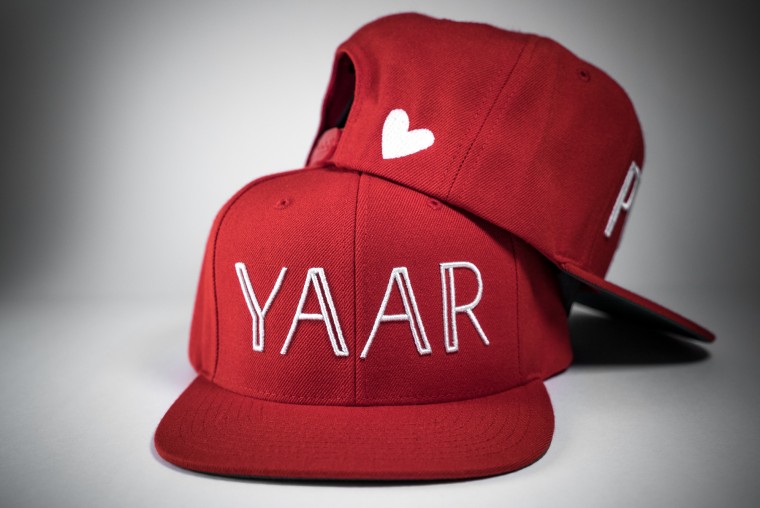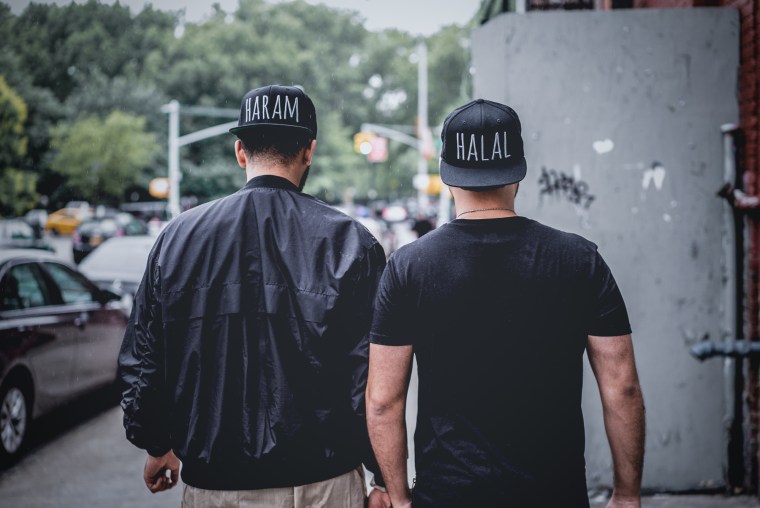Pakistani-American designer and artist Atif Ateeq didn't see very many brands catering to Muslim or South Asian Americans when he started his line of accessories, named "HALAL-HARAM," last year. He knew the line, which features hats emblazoned with the words "haram" and "halal" across the front, would be successful, he says, but he didn't realize to what extent.
“I knew guys were going to be into it, but I was pleasantly surprised with the amount of females who vibed with this project and incorporated the hats into their fashion aesthetic,” Ateeq told NBC News.
More than 100 hats sold on his website within days of the release, he says. On his Instagram, he regularly posts photos of people, mostly younger South Asian and Muslim Americans, wearing them.
But the collection’s success was loaded with controversy. The Arabic words halal, which translates to “permissible,” and haram, which translates to “unlawful” or “forbidden,” are based in Islamic scripture and describe acts that go against or conform with holy texts. It was that basis that inspired Ateeq to create the collection in the first place, so he wasn’t at all surprised when the “Haram” merchandise elicited a strong response from the community.
“I really liked this idea of the duality of our existence and how we constantly live within the spectrum of halal and haram,” Ateeq said. “People were like 'why would anyone put haram on their head and walk around?' But you can’t tell people what to do. You have to let them decide. Obviously they don’t have the same idea of that word as you do.”
Ateeq has made it his life’s work to change mainstream ideas about the two communities that form his identity: South Asian Americans and Muslim Americans. The 31-year-old emigrated from Pakistan to Brooklyn with his family at the age of 10 and from the beginning, success was important for him, but he believed in doing things his own way. In high school, he fell in love with photography, and it would be his entry into a life of creative entrepreneurship.
“Around the time 9/11 happened, my photography teacher saw that I was taking pictures of my family and my neighborhood in Brooklyn,” Ateeq said. “He said I was telling the story of a community after a time that’s really important historically in America. So, I started photographing my dad and his cab driver friends.”
According to Ateeq, the photos led to his first photography exhibit, which was featured at the Brooklyn Museum and documented the aftermath of 9/11 on Muslim New Yorkers. After that initial success, he channeled his talent into several businesses.
After graduating from New York University's Tisch School of Arts in 2006, Ateeq and a friend launched, VANE NYC, a menswear line that sold at Saks Fifth Avenue and Nordstrom along with its own retail location in New York.
“Coming to America, you always have this idea of freedom. I wanted that freedom and I didn’t feel like working for someone else at a company that I may not fully believe in was freedom,” Ateeq said.
But mounting financial pressures and a disenchantment with the retail business prompted Ateeq to shift gears. He went back to NYU in 2011 for a graduate program in interactive design and technology, which led to a career in creating videos for fashion brands like Oscar De La Renta, DKNY, and Helmut Lang.
Last spring, Ateeq exhibited his multimedia installation, “Hands Up,” in Long Island City, Queens. The exhibit simulated a conversation about race relations and police brutality in the U.S.
Ateeq is currently working on a new project tentatively entitled "H-Y-F-N," scheduled to launch later this year. The project will be a way for South Asian and Muslim-American creatives to tell their stories, Ateeq said.
“I think that one of the only ways you can battle the negative imagery that’s being portrayed in the media about brown people or Muslims right now [is] to create beautiful work to battle it," he said. "To tell the stories of the people that are actually doing great things and really changing the mold and shifting the culture.”

And last month, Ateeq launched his second collection of hats, which feature the words “Pyar” and “Yaar,” meaning "love" and "friend" in Urdu respectively. The new line doesn’t come with the controversy of HALAL-HARAM but it does impart an important message.
“I wanted to expand on this idea of the community becoming closer to each other, everyone accepting and uniting with each other,” Ateeq said. "I thought the idea of love was a little lost within our community. It’s celebrated in Bollywood movies. but it’s denounced in real life.”
Follow NBC Asian America on Facebook, Twitter, Instagram, and Tumblr.
